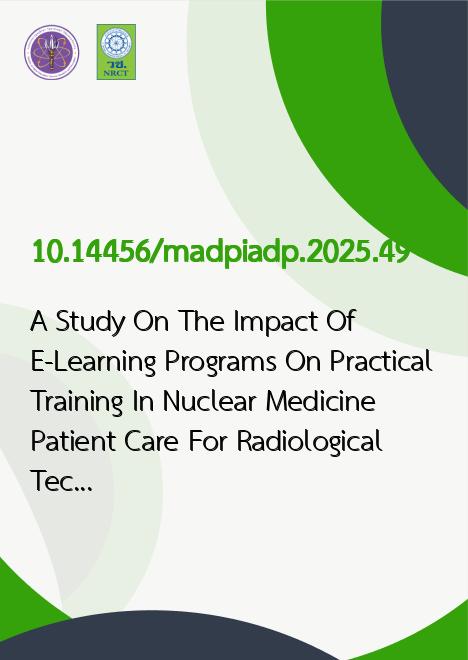
|
A Study On The Impact Of E-Learning Programs On Practical Training In Nuclear Medicine Patient Care For Radiological Technology Students, Faculty Of Medicine, Prince Of Songkhla University |
|---|---|
| รหัสดีโอไอ | |
| Creator | Pawarin Kongpiriyakul |
| Title | A Study On The Impact Of E-Learning Programs On Practical Training In Nuclear Medicine Patient Care For Radiological Technology Students, Faculty Of Medicine, Prince Of Songkhla University |
| Contributor | Chaiyan Palaman, Jongwat Cheewakul |
| Publisher | DR.KET Institute of Academic Development and Promotion |
| Publication Year | 2568 |
| Journal Title | Modern Academic Development and Promotion Journal |
| Journal Vol. | 3 |
| Journal No. | 2 |
| Page no. | 344-364 |
| Keyword | Impact, E-Learning, Radiological Technology Students, Radiological Patient Care, Education |
| URL Website | https://so12.tci-thaijo.org/index.php/MADPIADP/ |
| Website title | https://so12.tci-thaijo.org/index.php/MADPIADP/ |
| ISSN | 2822-1095 |
| Abstract | This research aims to 1. study the post-learning scores of online lessons in the nuclear medicine patient care practice for radiologic technology students, 2. examine the impact of online lessons on the practice of nuclear medicine patient care for radiologic technology students, and 3. investigate the impact of online lessons on radiation safety practices during nuclear medicine patient care training for radiologic technology students. This is a research and development study. The sample group consisted of 31 fourth-year students from the Radiologic Technology program selected through purposive sampling. The data collection tools used were achievement tests, practice evaluation forms, and personal radiation dose assessment reports using OSL (Optically Stimulated Luminescence) dosimeter. The statistics used were frequency, percentage, mean, and standard deviation.The results of the study revealed that:1. After completing the online lesson, the students had an average score of 9.48 out of 10. A total of 21 students passed the test with a perfect score of 10, accounting for 67.74%.2. After 6 weeks of practice, the students’ scores in 3 areas were at a moderate level, including the evaluation of knowledge and understanding of nuclear medicine procedures (e.g., Bone scan, Myocardial perfusion, Renal scan), the preparation and quality control of radiopharmaceuticals, and the ability to explain instructions clearly and accurately. However, their awareness of radiation safety was rated at a good level.3. The radiation dose assessment using OSL dosimeter showed that the students had an average personal radiation dose of 34.29 microsieverts, which was within a safe and low range compared to the data from the previous 3 years (2021, 2022, and 2023), which had average doses of 56.82, 142.42, and 49.36 microsieverts, respectively. The findings of this research indicate that online lessons have a positive impact on the development of skills and knowledge in radiologic technology students for nuclear medicine patient care, and they help reduce radiation exposure to safe levels. |